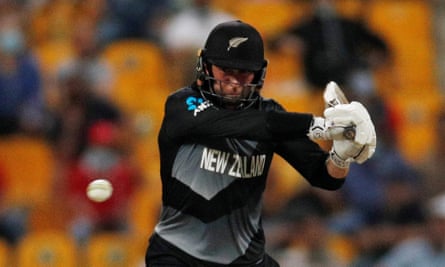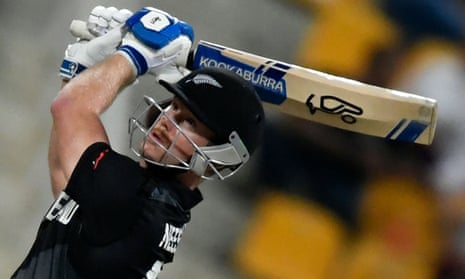At this point, the most surprising thing about New Zealand making it to the T20 World Cup final is that anyone is still surprised by it at all. This is the team that reached the final of the 2015 World Cup, the final of the 2019 World Cup (which they lost, of course, because of a clause in the small print), who won the inaugural World Test Championship, and who are currently ranked as the best side in the world in Test and ODI cricket. For the past five years, they’ve been the best, and most effective, all-format team in the sport. And yet, flick back three weeks to the tournament previews and you’ll find that they were sixth in the betting.
India were favourites, then England, Pakistan, Australia, South Africa and New Zealand. Given the way we all talk about them, “and New Zealand” is maybe what they ought to rename the side. Always an afterthought, everybody’s second favourites. The New Zealanders, you guess, are perfectly happy with that. There used to be a theory, back in the 2000s, when the All Blacks always blew up in the knockout rounds of the Rugby World Cup, that the team couldn’t handle the pressure that came with being favourites. It’s not a problem the Black Caps have had to worry about, even while they’ve been beating everyone else so often.
They haven’t only turned themselves into the best team in the world, they’ve somehow done it without anyone else really even noticing it was happening. They’re elaborately camouflaged, a ruthlessly efficient team masquerading as a scrappy bunch of underdogs from the world’s boondocks. They’re a World XI who make out as if they’re Ilford Seconds. Which is why there’s precious little point asking them exactly how they’ve gone about this transformation (I’ve tried, repeatedly), because a proper answer would blow their cover and sound uncomfortably like bragging.
If you ask their senior players, they will talk about the team culture, about a set of values shaped by Brendon McCullum when he was captain. They will mention the strength of their domestic set-up, and the quality of the pitches they play on, and at the end of it you will be left with no real idea how a country which, according to the board’s latest reports, has only 68,383 registered players and about half as much money as Virat Kohli owns, has turned out a team who can consistently beat the bigger and better resourced sides. You’d have had more luck asking Arkle to explain why he can run so fast.

From this distance, it seems that at least half those 68,383 are apparently capable of biffing a few sixes and bowling a tidy over or two, another quarter of them can keep wicket too, a large part of the rest bowl swing and seam at about 85mph, and the other one is Kane Williamson. This is a team who have been playing Daryl Mitchell, a bloke who has never opened in professional cricket, at the top of the order, who lost one fast bowler, Lockie Ferguson, and were able to replace him with another in Adam Milne, while they left a third, Kyle Jamieson, on the bench. They couldn’t even fit Finn Allen, Ross Taylor and Colin de Grandhomme into the squad.
New Zealand, who have one of the smallest pools of professional players in the world game, still have enviable strength in depth. And they’ll need it, now that Devon Conway had to pull out of the final because he broke his hand when he punched his bat after he got out against England the other night (“It’s not the smartest thing he’s ever done,” said head coach, Gary Stead). Conway is a big loss, at a bad time.
Because there is, of course, one thing missing in this picture. As Jimmy Neesham said when he was asked why he refused to celebrate after the team won their semi-final, “The job’s not done yet”. New Zealand may have won the World Test championship, but they’ve never won an international tournament in white ball cricket. And if that wasn’t enough pressure already, it would have to be Australia who are in their way again this time. This is, to use the new cliche, not a “match-up” that much suits them. The New Zealand government’s own history website describes the rivalry with Australia as like one with “an older sibling who haven’t always taken us seriously”.
The Australians waited 16 years before playing New Zealand in a one-off Test, beat them by an innings and 103 runs in one and a half days, then (come back when you’ve grown up) refused to play them again for another 27 years. In all, New Zealand have played Australia 212 times across the three formats, and beaten them in only 51, which is their worst win/loss record against any team in international cricket. It hasn’t been much better in the past five years either, when Australia have beaten them in five out of five Tests, six out of 11 ODIs and five out of nine T20s. Last time they met in a final, in the 50-over World Cup in 2015, Australia marmalised them.
This is one fixture where playing the underdog doesn’t seem to pay off. Which might be why it’s time for New Zealand to admit that, given everything else they’ve achieved recently, they ought to be the favourites to win it.
